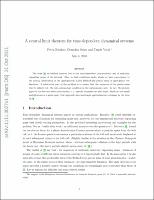Please use this identifier to cite or link to this item:
https://hdl.handle.net/20.500.12202/9560Full metadata record
| DC Field | Value | Language |
|---|---|---|
| dc.contributor.author | Nándori, Péter | - |
| dc.contributor.author | Szász, Domokos | - |
| dc.contributor.author | Varjú, Tamás | - |
| dc.date.accessioned | 2023-11-28T21:40:35Z | - |
| dc.date.available | 2023-11-28T21:40:35Z | - |
| dc.date.issued | 2012 | - |
| dc.identifier.citation | Nándori, P., Szász, D., & Varjú, T. (2012). A Central Limit Theorem for Time-Dependent Dynamical Systems. Journal of Statistical Physics, 146(6), 1213–1220. https://doi.org/10.1007/s10955-012-0451-8 | en_US |
| dc.identifier.issn | 0022-4715 (print) 1572-9613 (online) | - |
| dc.identifier.uri | https://ezproxy.yu.edu/login?url=https://search.ebscohost.com/login.aspx?direct=true&AuthType=ip,sso&db=a9h&AN=73277032&site=eds-live&scope=site | en_US |
| dc.identifier.uri | https://hdl.handle.net/20.500.12202/9560 | - |
| dc.description | Scholarly article / Open access (arXiv PDF) | en_US |
| dc.description.abstract | The work by Ott et al. (Math. Res. Lett. 16:463-475, ) established memory loss in the time-dependent (non-random) case of uniformly expanding maps of the interval. Here we find conditions under which we have convergence to the normal distribution of the appropriately scaled Birkhoff-like partial sums of appropriate test functions. A substantial part of the problem is to ensure that the variances of the partial sums tend to infinity (cf. the zero-cohomology condition in the autonomous case). In fact, the present paper is the first one where non-random examples are also found, which are not small perturbations of a given map. Our approach uses martingale approximation technique in the form of Sethuraman and Varadhan (Electron. J. Probab. 10:121-1235, ). [ABSTRACT FROM AUTHOR] Copyright of Journal of Statistical Physics is the property of Springer Nature and its content may not be copied or emailed to multiple sites or posted to a listserv without the copyright holder's express written permission. However, users may print, download, or email articles for individual use. This abstract may be abridged. No warranty is given about the accuracy of the copy. Users should refer to the original published version of the material for the full abstract. (Copyright applies to all Abstracts.) | en_US |
| dc.description.sponsorship | Acknowledgements The authors are highly indebted to Mikko Stenlund and Lai Sang Young for first explaining their result in October 2010 and second for a most valuable discussion in April 2011. | en_US |
| dc.language.iso | en_US | en_US |
| dc.publisher | Springer | en_US |
| dc.relation.ispartofseries | Journal of Statistical Physics;146(6) | - |
| dc.rights | Attribution-NonCommercial-NoDerivs 3.0 United States | * |
| dc.rights.uri | http://creativecommons.org/licenses/by-nc-nd/3.0/us/ | * |
| dc.subject | CENTRAL limit theorem | en_US |
| dc.subject | *DYNAMICS | en_US |
| dc.subject | *GAUSSIAN distribution | en_US |
| dc.subject | *MEMORY loss | en_US |
| dc.subject | *PERTURBATION theory | en_US |
| dc.subject | Central limit theorem | en_US |
| dc.subject | Limiting variance | en_US |
| dc.subject | Time-dependent systems | en_US |
| dc.title | A central limit theorem for time-dependent dynamical systems | en_US |
| dc.type | Article | en_US |
| dc.identifier.doi | https://doi.org/10.1007/s10955-012-0451-8 | en_US |
| dc.contributor.orcid | 0000-0001-8238-6653 | en_US |
| local.yu.facultypage | https://sites.google.com/view/peternandori/ | en_US |
| Appears in Collections: | Stern College for Women -- Faculty Publications | |
Files in This Item:
| File | Description | Size | Format | |
|---|---|---|---|---|
| Nandori 2012 arXiv Central Limit 1111.0027.pdf | 124.26 kB | Adobe PDF |  View/Open |
This item is licensed under a Creative Commons License

